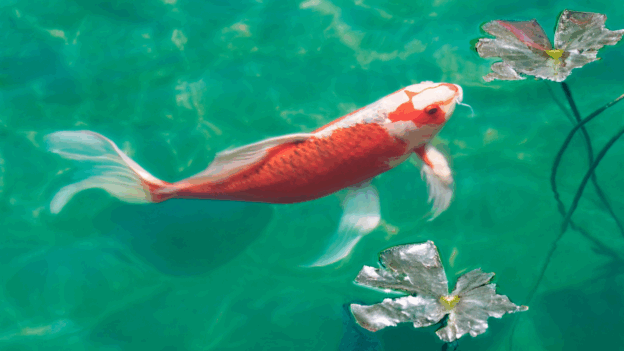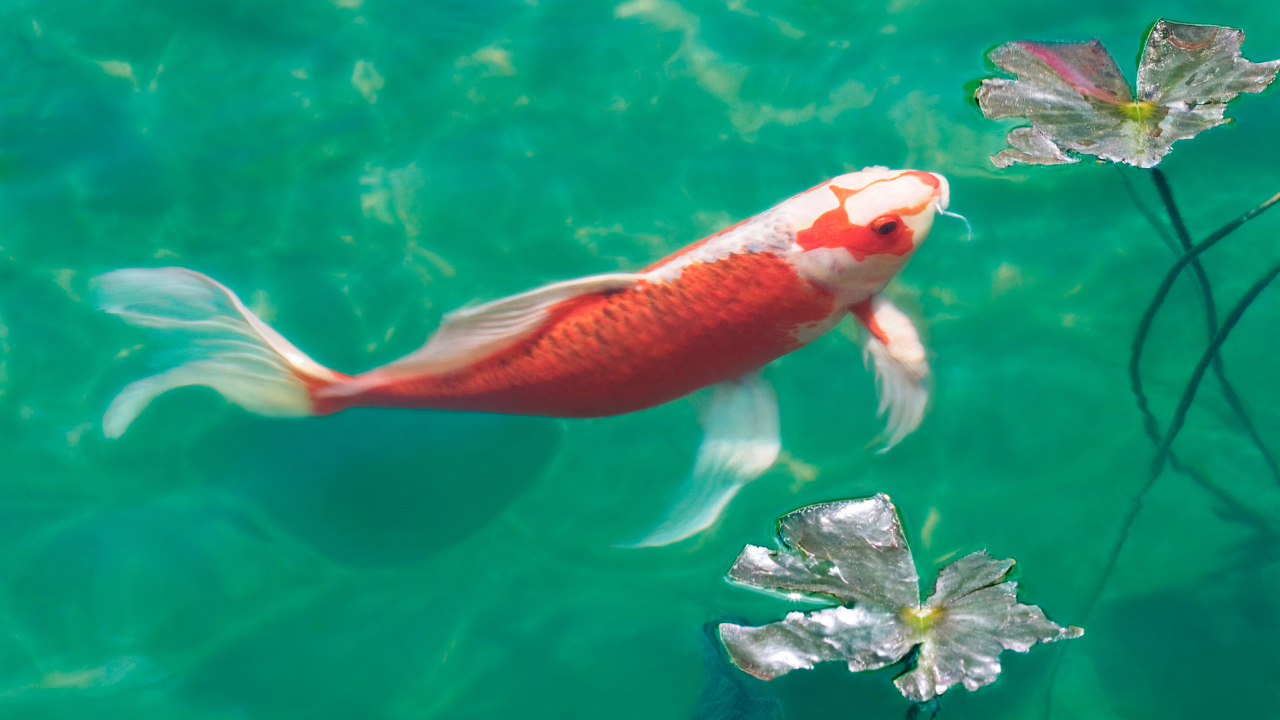Key Takeaways
- Early detection of koi illness prevents more serious health problems and costly pond repairs.
- Lethargy, loss of appetite, and unusual swimming are among the most common red flags.
- Visible issues like ulcers, fin rot, or gasping at the surface can indicate advanced disease.
- Maintaining water quality and regular pond care reduces the risk of koi illness.
- Professional services provide expert support for diagnosis, treatment, and long-term pond health.
Koi are often the centerpiece of koi ponds and backyard water gardens, admired for their colors, size, and calming presence. But koi are also sensitive. Poor water conditions, stress, or physical injury can quickly lead to illness.
Following are the key points on How to Tell If Your Koi Fish Are Sick: 7 Warning Signs:
- 7 Warning Signs Your Koi Fish May Be Sick
- What Are the Most Common Signs of Illness in Koi Fish
- Common Koi Fish Diseases to Watch For
- Preventing Illness Through Consistent Pond Care
Healthy koi are active, responsive, and display vibrant colors. Any sudden change in their behavior or appearance is worth investigating immediately.
7 Warning Signs Your Koi Fish May Be Sick
1. Lethargy and Hiding
If koi are resting for long periods at the bottom or constantly hiding, it can be linked to parasites, stress, or infections. While some rest is normal, prolonged inactivity often indicates trouble.
2. Loss of Appetite
Koi usually rush to the surface during feeding. When they stop eating or ignore food, it can suggest digestive issues, parasites, or poor water quality. Sometimes, a water change helps, but persistent loss of appetite signals deeper issues.
3. Unusual Swimming Patterns
Erratic swimming, darting, or scraping against pond walls often points to parasites like anchor worms or skin irritation. Watching how koi swim is one of the fastest ways to detect illness early.
4. Gasping at the Surface
This may indicate low oxygen, poor pH levels, or gill damage from White Spot Disease. Immediate action is needed since oxygen problems can kill pond fish quickly.
5. Visible Ulcers or Lesions
Open sores, ulcers, or red streaks are often signs of bacterial or fungal infections. These koi fish diseases spread fast if left untreated, especially when koi are already stressed by high temperatures or an ammonia spike.
6. Fin Rot and Frayed Fins
Frayed fins are usually linked to bacterial infections or overcrowding. When left untreated, the damage worsens, making koi more vulnerable to Koi Herpes Virus or other severe illnesses.
7. Clamped Fins and Sluggish Movement
When koi keep their fins tight against their bodies and move sluggishly, it’s a common sign of stress. Stress weakens immunity, allowing conditions like fungal infections to take hold more easily.
What Are the Most Common Signs of Illness in Koi Fish?
The most common signs are lethargy, lack of appetite, unusual swimming, ulcers, gasping at the surface, fin rot, and clamped fins. These symptoms usually indicate parasites, infections, or poor water quality.
Early detection and quick treatment often save koi’s lives and prevent larger outbreaks in your pond.
Common Koi Fish Diseases to Watch For
Several illnesses appear frequently in koi ponds:
- White Spot Disease (Ich): Identified by tiny white spots on the skin and fins. Treatments like Quick Cure can be effective if applied early.
- Anchor Worms: Small, thread-like parasites visible on koi bodies. They cause irritation and encourage secondary infections.
- Fungal Infections: Appear as cotton-like growths on the body or fins. Usually results from poor water conditions or injury.
- Koi Herpes Virus (KHV): A highly contagious viral disease causing gill damage, lethargy, and high mortality. Prevention is crucial since treatment options are limited.
Why Water Quality Is Key to Koi Health
Poor water conditions are one of the biggest causes of koi illness. Issues like an ammonia spike or a disrupted nitrogen cycle quickly create stressful environments. Regular water testing for pH levels, ammonia, nitrites, and oxygen is essential.
Tools like a UV sterilizer help manage algae and harmful microorganisms, keeping the pond environment balanced. Proper pond builds with adequate filtration and aeration also reduce health risks for pond fish.
Preventing Illness Through Consistent Pond Care
Most koi health issues can be avoided through consistent care. Professional pond care programs often include water testing, algae control, seasonal inspections, and fish health checks. These services reduce the chances of emergencies and protect long-term pond health.
Homeowners also benefit from using high-quality equipment. Trusted providers offer reliable pond fountain parts and supplies in Orange County such as pumps, filters, and UV clarifiers, which improve water circulation and stability.
The Role of Professional Repair and Maintenance
When koi become sick, it’s often tied to underlying issues such as equipment failure or water leaks. Expert pond and fountain repair in Orange County identifies and resolves these problems before they worsen.
From repairing filtration systems to restoring proper oxygen flow, professional services keep koi ponds and water gardens safe and thriving.
Seasonal Tips for Koi Health
- Spring: Perform a deep clean, refresh water treatments, and check equipment before fish become more active.
- Summer: Watch for algae blooms, anchor worms, and white spots as higher temperatures increase stress.
- Fall: Remove dead plants and prepare koi for cooler water with diet adjustments and water changes.
- Winter: Reduce feeding, check heaters or aeration, and inspect equipment while fish activity slows down.
Making Koi Health a Priority
Protecting koi goes beyond feeding—they rely on stable water conditions, healthy equipment, and attentive care. By recognizing warning signs early, monitoring water quality, and seeking expert help when needed, you’ll create a thriving pond where koi can flourish for years.
At Orange County Pond Services, we’ve been supporting koi owners since 2001. From koi fish health checks to pond builds, repairs, and maintenance, we provide expert care for every pond. Whether it’s preventing koi fish diseases, handling emergencies, or setting up reliable long-term systems, our team is here to keep your pond vibrant. Contact us today to schedule expert pond care and protect your koi.

